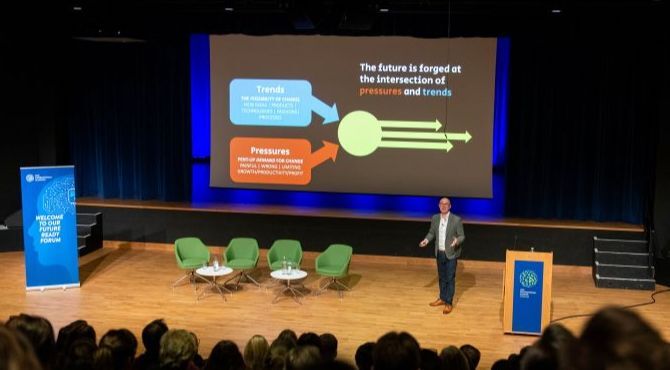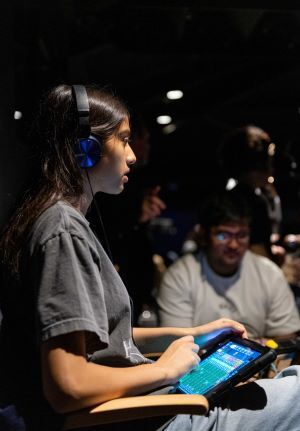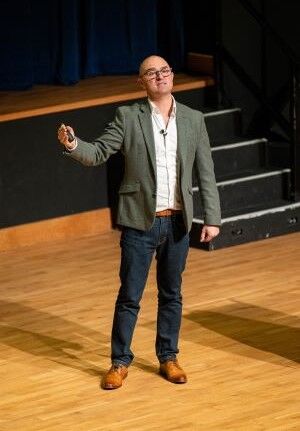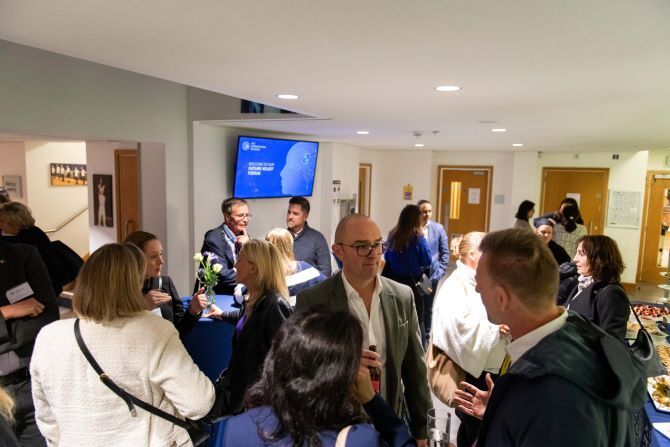Learning how to think about the future and the skills business and students need
The future is there for the making. But how many of us have a framework to understand what’s ahead and orientate towards it? Fiona Murchie reports from ACS Cobham’s Future-Ready Forum, where renowned futurist Tom Cheesewright outlined the likely challenges and responses we all need.

 18 October 2024
18 October 2024This article is taken from the Winter 2024/25 issue of
Think Global People magazine
Click on the cover to access the digital edition.Opening his presentation at ACS Cobham’s Future-Ready Forum, applied futurist Tom Cheesewright explained his role was not as an oracle. Instead, he teaches people how to think about what’s ahead.Tom Cheesewright works largely with big organisations, multinational corporations and government departments wanting to know what the next two to five years look like and what the big opportunities or threats might be 20–30 years ahead. He guides executives on how to do that thinking for themselves. There is a lot of storytelling involved and trying to convince people of the need for change and action. Most of his work is about innovation and organisational change. This ranges from developing a breakfast product to the shape of the future-ready organisation.Speaking to Tom Cheesewright ahead of the presentation, I asked him what the future for the ACS students attending and other young people will be. His response was optimistic, explaining he thought their future is going to be quite different. “Look how much culture has changed in the last 20 years, how much the economy and aspirations and expectations have changed.“For example, 20–25 years ago aspirations about what we own were about having a big DVD collection or a beautiful sound system or a shiny car, whereas now people are so much more aspirational about what they do and the experiences they have both in work and outside of work. They want to learn. They want to travel places and they want to be seen travelling to those places,” he said.“One of the things I’ve noticed coming here to the school is how much they are using practical exposure, as well as academic education, to really start to develop some of the skills I am going to talk about tonight.”
Read related articles
- How to teach future-readiness
- Future-Ready Forum reveals top skills students need to thrive in the future
- AI in education
- 10,000 students descend on Thorpe Park for a rollercoaster day of STEAM learning
- A class act: education of the future


Managing uncertainty
I put it to him that one of the things that really frightens people is the fast pace of change. How do people cope with that without feeling overwhelmed? Responding, he said: “Even five years ago now when I did the original research, two-thirds of the country said that they felt destabilised and that the speed of change was knocking them off their feet and I suspect it has only got worse since then.“There is such rapid change. Not in everything; I live in a 150-year-old house and that hasn’t changed an awful lot in 150 years. But lots of things do change very quickly. Media, technology, culture, fashion, food, and the range of things we eat has accelerated so much because technology has stripped the friction from innovation and distribution. Things can be designed into products and services and shipped so much faster than they could 10 or 20 years ago thanks to technology.“You’ve got to be able to respond to that. You’ve got to be able to take in the information, process it and create new things for that changing market demand.” Communicating is vital too, he concluded, “You’ve got to be able to sell your ideas in the current world.”At the presentation to an engaged audience of over a hundred students, parents and guests he explained a process to unlock the future and design a future-ready strategy. Something ACS Schools are very much on top of.“The most common question I am asked as a futurist is ‘what should I teach my kids to prepare them for tomorrow’s world?’” said Tom Cheesewright. “Parents understand that the world has changed since their time at school and they are looking for educators who also understand that.”He explained how the future is forged at the intersection of pressures and trends. Outlining his Intersection Tool, he said it is “a very simple way of thinking about the future that you can take away, no matter how old you are”.It involves two aspects: trends and pressures (see box). “The pressures are things that annoy you, that wind you up or slow you down. It is easy to find out what these frictions are because you just have to ask people and, as people like to complain, they tell you.“Looking for trends is again quite easy to do. Explore what is happening in other countries that might come over here. Are people doing things differently in China or Germany that we might adopt? What are your most forward-thinking customers doing already that the rest of your customers might do? Some of those trends are going to make things better and others are going to exacerbate the problem.”
Tom Cheesewright’s Intersection Tool for future-focus
TrendsThe possibility of change:new ideasproducts
technologies
fashions
processesPressuresPent-up demand for change:painful
wrong
limiting
growth
productivity
profitHis presentation also revealed the three different skill sets to drive big change in the future.
- The first is the ability to curate, discover and qualify information. Where are the gaps in your knowledge and how do you fill them? What are the gaps your company has about markets and competitors? How do we find that information and how do we put it to good use?
- The second is creativity. You have to be creative. Creativity is a muscle, a skill we can all learn. It is a set of practices. Learn to make things, to test things, to fail, to remix and recombine, take two old things and mash them together to make something great again. And learn to craft.
- The third is communication. You’ve got to be able to sell your ideas. Sell yourself, sell your organisation to customers, partners and employers and get comfortable with it. It is a skill you can learn, practice and develop. In some ways, you have got to get yourself across and maximise that humanity and show people that you are real.
- Victoria Humphries, culture, change and resilience consultant
- Robert Harrison, director of education and integrated technology
- Bhekinkosi Sibanda, ACS university counsellor
- Tom Cheesewright, applied futurist
Find out more by reading:
‘See Inside the Future’ In this new children’s book, Tom Cheesewright takes readers on a tour of our world, decades into the future. Eight scenes show you what wonders await in our cities, our landscapes, inside our own bodies and, of course, in the expanse of outer space. Lift the flaps to find out what new things we'll be able to do, how new technology will work and what changes we can expect about the way we live. “The future is a place of great hope and excitement, and it's closer than you dare to dream.”‘Future-proof Your Business’As a world-leading applied futurist, Tom Cheesewright draws from his own experience, industry authorities and case studies from global organisations to provide practical tools for successful change management. He explains how to scan the horizon for early signs of change, recognise pressure points where change will impact your business, convert foresight into action ahead of competitors and empower your people to make the right decisions fast.‘The Usborne Book of the Future’First published in 1979, the book started the young Tom Cheesewright on his trajectory to become a futurist and he has written the foreword for the new edition.ACS International Schools
Founded in 1967 to serve the needs of global and local families, ACS International Schools educate over 3,300 students, aged 2–18, day and boarding, from more than 100 countries. Its schools in Greater London are all non-sectarian and co-educational. At the heart of its approach is the idea of readiness. It empowers students with the skills and knowledge to thrive in a world that is changing fast. ACS International Schools’ world-renowned curriculum includes all International Baccalaureate (IB) Programmes, and top US programmes, including Advanced Placement (AP) courses and the AP Capstone and International Diplomas.Students leave ACS as well-rounded global citizens with the academic and emotional intelligence to empathise and engage with tomorrow’s big issues, turning compassion into action as they stand ready for a future full of opportunity.
Read Relocate Global's Guide to International Education & Schools 2022/23 which is packed with expert tips and information for those relocating and the professionals supporting them.
Relocate Global's Guide to International Education & Schools 2024/25 coming soon!
Find out more about the Think Global People and Think Women community and events.


Subscribe to Relocate Extra, our monthly newsletter, to get all the latest international assignments and global mobility news.Relocate’s new Global Mobility Toolkit provides free information, practical advice and support for HR, global mobility managers and global teams operating overseas.
©2025 Re:locate magazine, published by Profile Locations, Spray Hill, Hastings Road, Lamberhurst, Kent TN3 8JB. All rights reserved. This publication (or any part thereof) may not be reproduced in any form without the prior written permission of Profile Locations. Profile Locations accepts no liability for the accuracy of the contents or any opinions expressed herein.








































